One of the main themes of the 37th convention of the Secretary Generals of the European Episcopal Conferences was the encyclical “Caritas in Veritate”
Thursday, 23 July 2009, 14:34 One of the main themes of the 37th convention of Secretary Generals of European Episcopal Conferences, which took place July 9-12, 2009, at a retreat in Brukhovychi near Lviv, was the third encyclical of Pope Benedict XVI entitled “Caritas in Veritate” (Mercy in truth). This document, written by the Holy Father, was signed on June 29, 2009, and was published on July 7 in Latin, Italian, French, English, German, Spanish and Portuguese.
One of the main themes of the 37th convention of Secretary Generals of European Episcopal Conferences, which took place July 9-12, 2009, at a retreat in Brukhovychi near Lviv, was the third encyclical of Pope Benedict XVI entitled “Caritas in Veritate” (Mercy in truth). This document, written by the Holy Father, was signed on June 29, 2009, and was published on July 7 in Latin, Italian, French, English, German, Spanish and Portuguese.
During a meeting with religious journalists, Fr. Guns Langendorfer, PhD, Secretary of the German Episcopal Conference, explained that the third encyclical addressed social issues, drawing upon the famous 1967 encyclical of his predecessor Pope Paul VI entitled “Populorum Progressio” (Progress of nations). In the opinion of Fr. Guns, Pope Benedict XVI emphasizes three main points in “Caritas in Veritate.” Firstly, the focus of his document is humans, not business or money. Fr. Duarte da Kunya, Secretary General of the European Council of Episcopal Conferences commented that, “the main idea behind the encyclical is that the Church is centered around humans. The Church has to look at humanity in its totality, in its development and to assist this development on all levels: intellectual, spiritual, economic, political and social. This is the task of the Church – to protect humanity.” Secondly, people, as citizens of their respective countries, have the right to take part in state life. “The poor and the marginalized cannot influence or have a voice in their own country, this has to change,” said Fr. Langendorf. Thirdly, different countries have a different level of development. It is necessary to pay attention to poorer countries and to help them. “We should think about polycentrism. Countries do not have identical economies, which is why we have to open markets. In this way, countries will not only do what is good for the European Union, or some other powerful states, but rather they will make it a priority to help those that are suffering the most,” explained the Secretary of German Episcopal Conference.
Secretary of Synod of Bishops of the UGCC Bishop Bohdan (Dzyurakh) commented on the importance of social service for the Church. “The social service theme is very important for us, especially when we take into consideration how communist rule forbade the Church’s charitable activities. The Church has become active again in these areas which had been previously appropriated by the state. The Church can give something greater than bread: it can give love, Divine care, and the feeling of closeness to other humans. For this reason, the new encyclical will be of great help in further developing important social services,” commented Bishop Bohdan.
Background Information
Pope Benedict XVI signed the first encyclical “Deus caritas est” (God is love) on December 25, 2005. It was circulated a month after its completion and was an original theological reflection about the essence of divine love as the basis for the church’s mission of mercy and love of humanity.
The second encyclical of the Pontific “Spe salvi” (Rescued a hope) was published on November 30, 2007 and described the Christian understanding of hope in today's world.
Information Department of the UGCC
LATEST NEWS

We can imagine what the prayer of the prisoners in the Russian torture centers in the Ukrainian Kharkiv region was like – Head of the UGCC on the 206th day of the war 17 September
A vast cemetery, a mass burial, was found near the city of Izyum, in which more than 400 innocently killed and tortured people have already been...
-
 Глава УГКЦ у 158-й день війни: «Нехай Господь прийме з уст нашої Церкви псалми та моління за всіх тих, які особливо просять нашої молитви»
Глава УГКЦ у 158-й день війни: «Нехай Господь прийме з уст нашої Церкви псалми та моління за всіх тих, які особливо просять нашої молитви»
-
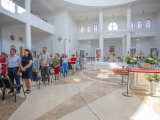 «Сила, яка походить із вірності Христові, є стержнем, який ніхто не може зламати», – Блаженніший Святослав
«Сила, яка походить із вірності Христові, є стержнем, який ніхто не може зламати», – Блаженніший Святослав
-
 Глава УГКЦ у 157-й день війни: «В ім’я Боже ми засуджуємо звірства в Оленівці і світ повинен це засудити як особливий вияв дикості й жорстокості»
Глава УГКЦ у 157-й день війни: «В ім’я Боже ми засуджуємо звірства в Оленівці і світ повинен це засудити як особливий вияв дикості й жорстокості»
-
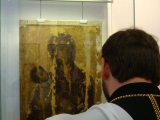 «Боже, почуй наш плач і поспіши нам на допомогу і порятунок!», – Глава УГКЦ у 156-й день війни
«Боже, почуй наш плач і поспіши нам на допомогу і порятунок!», – Глава УГКЦ у 156-й день війни
-
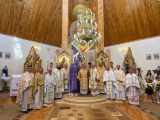 «Бог йому дав серце і душу українського народу»: відбулася щорічна проща до Прилбичів з нагоди уродин митрополита Андрея Шептицького
«Бог йому дав серце і душу українського народу»: відбулася щорічна проща до Прилбичів з нагоди уродин митрополита Андрея Шептицького
-
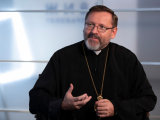 Глава УГКЦ: «Я горджуся українськими патріотами, які без найменшої краплі ненависті готові захищати своє»
Глава УГКЦ: «Я горджуся українськими патріотами, які без найменшої краплі ненависті готові захищати своє»
-
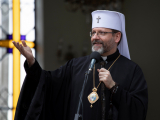 Блаженніший Святослав закликав українську молодь скласти присягу на вірність Христові
Блаженніший Святослав закликав українську молодь скласти присягу на вірність Христові
-
 Глава УГКЦ у 155-й день війни: «Помолімося, щоб не втратити скарбу віри князя Володимира»
Глава УГКЦ у 155-й день війни: «Помолімося, щоб не втратити скарбу віри князя Володимира»
-
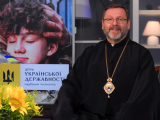 Блаженніший Святослав у День державності України: «Наша Держава – це для нас питання життя або смерті»
Блаженніший Святослав у День державності України: «Наша Держава – це для нас питання життя або смерті»
-
 Глава УГКЦ у 154-й день війни: «Нехай Господь Бог прийме у свої вічні обійми журналістів, які віддали за правду своє життя в Україні»
Глава УГКЦ у 154-й день війни: «Нехай Господь Бог прийме у свої вічні обійми журналістів, які віддали за правду своє життя в Україні»
-
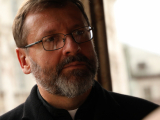 Глава УГКЦ у 153-й день війни: «Принесімо наш біль перед Боже обличчя і будьмо певні, що Він нас вислухає»
Глава УГКЦ у 153-й день війни: «Принесімо наш біль перед Боже обличчя і будьмо певні, що Він нас вислухає»
-
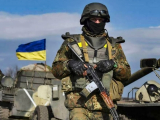 Глава УГКЦ у 152-й день війни: «Помолімся молитву заступництва за наших воїнів»
Глава УГКЦ у 152-й день війни: «Помолімся молитву заступництва за наших воїнів»
-
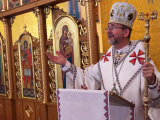 «Віруюча людина не може бути байдужою, коли бачить страждання іншої людини», – владика Богдан Дзюрах
«Віруюча людина не може бути байдужою, коли бачить страждання іншої людини», – владика Богдан Дзюрах
-
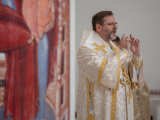 «Серед нашого страждання творімо простір для прояву Божої всемогутності», – Глава УГКЦ у 6-ту неділю після П’ятдесятниці
«Серед нашого страждання творімо простір для прояву Божої всемогутності», – Глава УГКЦ у 6-ту неділю після П’ятдесятниці
-
 Глава УГКЦ у 151-й день війни: «Російське віроломство ми перемагаємо силою любові до нашої Батьківщини»
Глава УГКЦ у 151-й день війни: «Російське віроломство ми перемагаємо силою любові до нашої Батьківщини»

